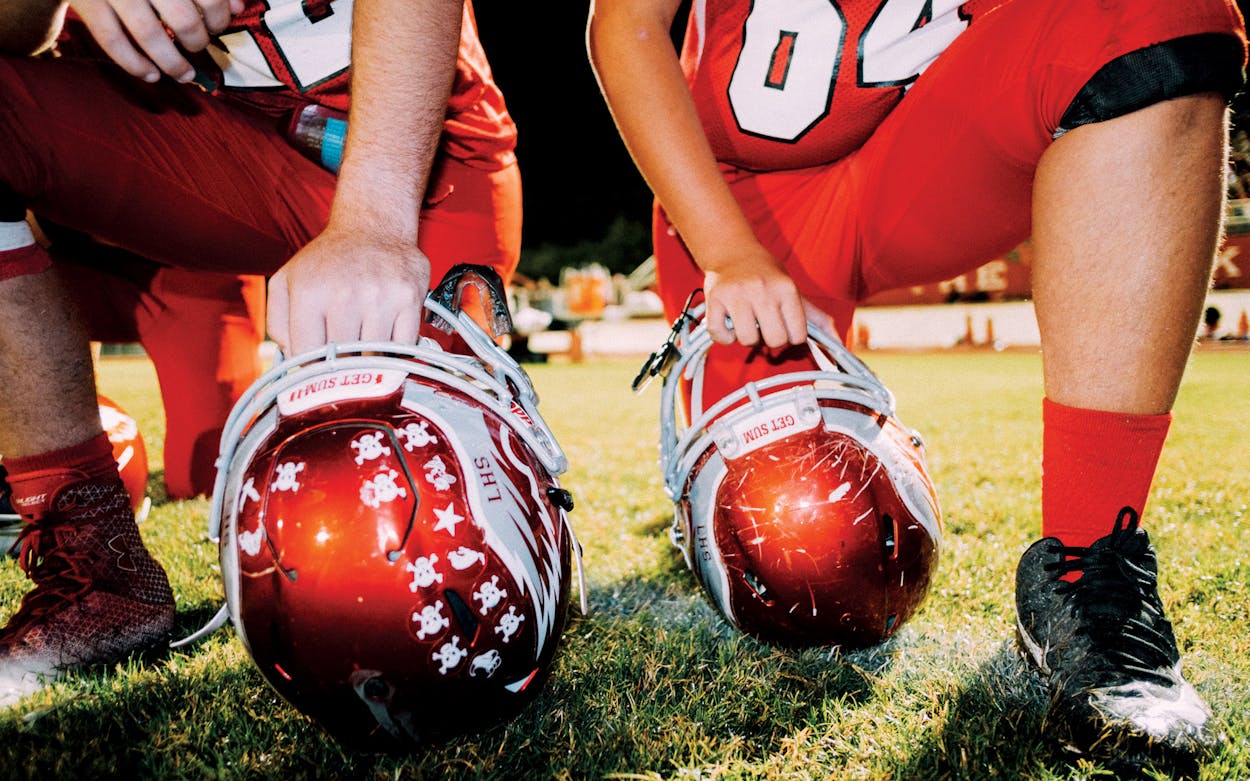On the afternoon of August 31, New Home School football players had just rallied to edge out the cheerleaders in a team hula-hoop competition when junior Riley Stokes—dressed as a leopard—grabbed a cordless microphone. It was the first pep rally of the 2018 season, and the crowd of students, teachers, and families didn’t need much coaxing to cheer. “The Leopards are starting a new season!” Stokes yelled, bending her knees and waving her free arm with a mascot’s trademark excitement. “And now, they’re playing eleven-man football!” The gym burst into cheers.
A few hours later, New Home sent eleven Leopards onto a football field for the first time since 1982. For more than three decades, the town of a little more than 350—located about twenty miles south of Lubbock—has been represented by a six-man football team, the University Interscholastic League’s special concession to its smallest schools.
The current minimum enrollment to qualify for UIL eleven-man play is 104.9 high school students, and New Home stood at 93 when the biannual state reclassification took place last February. But as Lubbock’s population balloons and families move out of the city for more elbow room, the New Home school system has grown. It’s on pace to outgrow UIL’s smallest enrollment category, Class 1A, likely by the next reclassification in 2020. So according to athletics director Koby Abney, the administration decided last fall “to turn the inevitable into the immediate” and go eleven-man beginning in 2018. Eighteen other UIL schools joined New Home in “playing up” to Class 2A, but 137 others will play six-man the next two academic years.

Hundreds of miles away from New Home, down in a picturesque southwest corner of the Hill Country, the town of Leakey (pronounced LAY-key) isn’t growing. The Frio River flows down the town’s east side and attracts visitors in the summer who enjoy rafting, tubing, and vacation properties. But Mayor Harry Schneemann, who played football for Leakey in the early sixties, noted the lack of a true industry in the 410-person town. “There’s no reason to move here, especially if you have a student playing sports,” he said. “But as long as there’s a river, there will be a Leakey.”
Road signs leading into Leakey boast that the Eagles were state football champions in 1975, the final year of the UIL’s eight-man division. Despite qualifying for six-man football, Leakey has played eleven-man ever since. It hasn’t treated them well. They’ve produced few winning seasons—only one in the past twenty years. Donnie Dutton, who served as the school’s athletic director for the past four years, said Leakey’s motivation for playing up for so long was primarily convenience—there was a dearth of six-man opponents located within a reasonable distance, which meant away games could be hard to navigate.
But neighboring rivals Medina and Nueces Canyon made the switch to six-man in recent years. And the 2017 Eagles were barely able to field an eleven-man team en route to a 1–9 finish. After taking those two factors into account, the school board overwhelmingly voted to reclassify as a six-man team last fall.
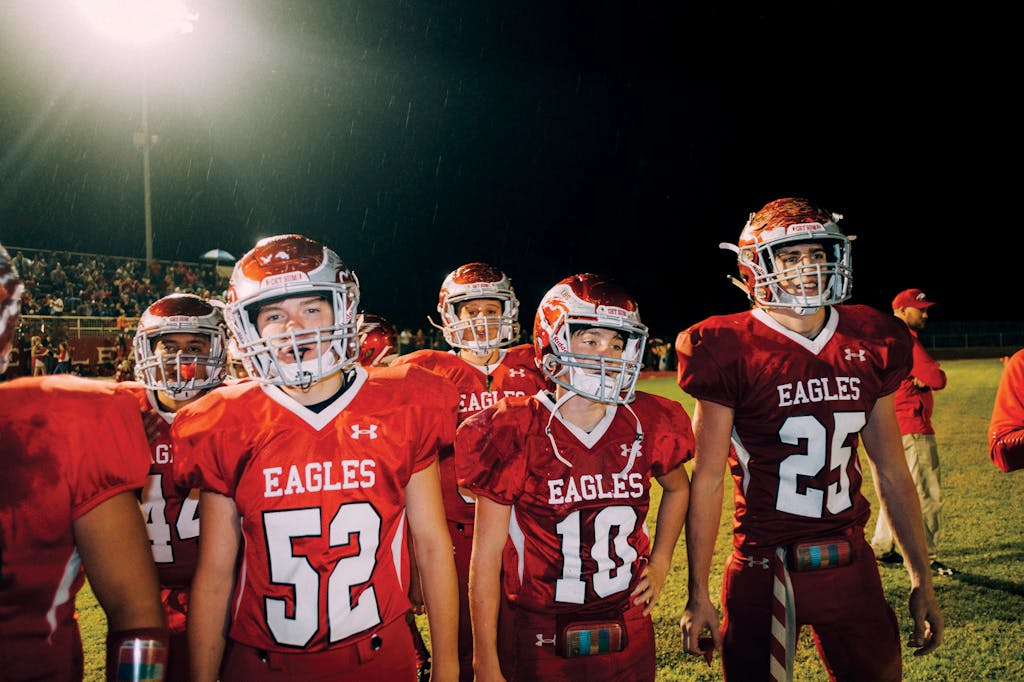
But Leakey had homework to do before taking the field. Six-man is played on a smaller field (80-by-40 yards instead of 100-by-50), requires fifteen yards for a first down instead of ten, allows all offensive players to catch a pass, and requires an additional exchange of the ball following the snap from center for an offensive player to run past the line of scrimmage. Following a touchdown, a run or pass is worth one point, and a kick is worth two. A six-man game typically features much more scoring. Because some games become hopelessly lopsided, the UIL employs a mercy rule to end play when a team leads by at least forty-five points during the second half (“getting 45’d,” in six-man parlance).
Last winter, Leakey hired Shannon Williams, a football coach with a strong background in six-man play. Williams coached for five seasons at Zephyr, near Brownwood, leading the team to the state semifinals in 2015. The coach saw an opportunity to make an impact on the six-man newcomers. “The coolest part about that job is you’re starting from the ground up, there’s not a six-man foundation at all there,” Williams told the Brownwood Bulletin after accepting the coaching job. “There’s a lot of kids, a lot of hungry kids. Everything that will be taught to them will be my program, so that’s all they will know about six-man. You’re not going into a town that will press for spread offense or tight, anything like that. Everything is new and they’re eager for it.”


But soon after he arrived in Leakey, Williams heard rumblings that some players didn’t think this was “real football.” Williams, who played on two high school six-man state championship teams at Panther Creek in the early nineties, showed his new charges a video of six-man. “Is it blocking?” Yes, sir. “Is it tackling?” Yes, sir. The only difference, Williams says, is now there are now six kids on a shorter field. “It’s a faster game,” he told the Eagles. Only one varsity player decided to not return.
Leakey opened the season at Rochelle. Eagles freshman Abel Montoya fielded the kick at the 11-yard line, broke to the left sideline, picked up some key blocks, and raced 69 yards for a touchdown. He quickly said a prayer in the end zone before being mobbed by his teammates (if five can constitute a mob). The Eagles went on to win the game 57–0.
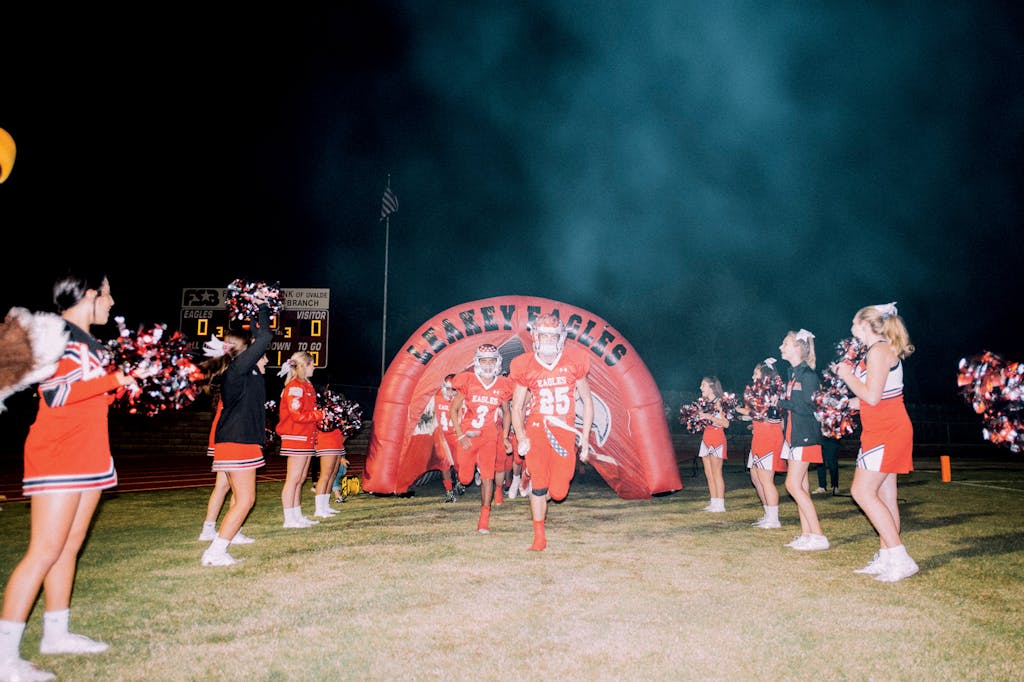
New Home’s transition to eleven-man might have been easier if coach Fernando Baeza could have held spring drills. But when he should have been breaking his players’ six-man habits, they were occupied playing spring sports—New Home’s baseball team reached the 1A state semifinals in Round Rock.
The Leopards opened at home against Hale Center, enrollment 174. The visiting Owls dressed almost forty players to the Leopards’ fifteen. (And since New Home doesn’t yet have a band, Hale Center’s played the national anthem.) The home-side bleachers were a sea of red and black.
Hale Center dominated from the outset, leading 30–0 at halftime. With 2:24 remaining in the third quarter, a Hale Center touchdown and kick made the score 45–0. One of the New Home fans seated in front of superintendent Shane Fiedler turned and asked, “Is the game over?” But there’s no UIL mercy rule in eleven-man.

The final score was 45–6. Seconds after the game ended, announcer Tracy Starkey told the crowd: “Give those kids a hand. They battled tonight.” But the New Home fans needed no such encouragement; they were already standing, applauding, and hollering as the Leopards lined up for the midfield handshake with the victorious Owls.
Baeza wondered if the rout would prompt parents to question the decision to play up. But before he walked home (he and his family live right behind the visiting bleachers), he heard only positive comments. Hale Center wisely used a hurry-up offense that minimized his opportunities to substitute, leaving some weary Leopards on the field. He filed away that nugget for the next game.
New Home lost its first five games by an average of 38 points, rested during a midseason off week, then began district play with a 71–6 loss to Tahoka. Next up was a mid-October trip to Lockney, where the Longhorns were also winless. Baeza stressed to his team that this was a winnable game, but he didn’t want to make his own winless team overconfident. “Somebody’s got to win,” he told them. “Might as well be us.”
When Blake Buckelew turned a screen pass into a touchdown in the first quarter, the sixty or so New Home fans clustered in the visitors’ stands went wild—it was their team’s first lead of the season. Buckelew ran about sixty yards for another touchdown in the second quarter and, thanks to two two-point plays, the Leopards led 16–0.


At halftime, Baeza again urged his players not to get carried away—though who would have blamed them? With New Home kicking off to begin the second half, assistant coach Brady Webb boldly suggested an onside kick to maintain the momentum of the first half, and Baeza gave his blessing. Quarterback Kaleb LeClair was able to spin his kick off Lockney’s artificial-turf field; the ball bounced off an opposing player and was recovered by New Home senior Hunter Cockerell.
While the possession didn’t result in any points, New Home was able to keep the ball away from Lockney’s clock-churning, ground-oriented offense for a significant period of time. The hometown Longhorns finally scored a touchdown in the fourth quarter, but when their two-point run was stopped near the five-yard line, the prospects for New Home’s first win of the season increased dramatically. The Leopards, with seventeen players, became worn down in the closing minutes and were “a little nervous,” senior Gabriel Cantu admitted, but they held on and won 16–6.
Baeza was proud that his players kept their composure during the postgame handshake line. In victory, they “acted like they’d been there before,” he said. They let loose on the bus ride home, though, which included descending upon an Allsup’s in Plainview and nearly liquidating the store’s supply of its “world famous” burritos.
With four of the six teams from New Home’s 2A district qualifying for the playoffs, just one more win would actually clinch a berth for the Leopards. And that nearly occurred the following week, when the home game against Crosbyton resulted in a frustrating 15–14 loss.
Still, New Home headed into the season finale at home against 8–1 Ralls in position to go to the playoffs even with the expected defeat, if Lockney could upset Crosbyton that same night.
It was a frigid night on the South Plains, the first Friday following the time change. Many New Home fans were bundled in blankets or hunting attire. The concession stand struggled to keep up with sales of hot chocolate.
The Leopards’ opening possession surprisingly reached Ralls’ 25-yard line. But that’s where it stalled, and it turned out to be New Home’s best scoring opportunity of the game. The visiting Jackrabbits led 7–0 after one quarter, 35–0 at the half, and cruised to a 49–0 victory.

Baeza gathered his players out on the field as they hugged and cried and then hugged some more. “It’s a long road,” he told them, having to raise his voice at times as the Ralls team celebrated its district title in the nearby end zone. “We’ll get there. I love you to death. It’s going to get better. I promise you that.”
Baeza also informed the boys that they still had a chance to go to the playoffs, with Crosbyton leading Lockney by only six points with five minutes to play. But Crosbyton held on, and there would be no playoff trip for the 1–9 Leopards.
Cantu and the other four seniors lingered the longest post-game, accepting congratulations from appreciative fans and forcing smiles for photos. Cantu admitted that he had once feared the Leopards would fare much worse in their first eleven-man season. “We were scared we were going to go . . . not win a game,” he said, appearing to stop himself short of using the phrase 0–10.
Some Leopards fans might have feared that too. They recognized the challenge that the team faced in making the transition to eleven-man before having a roster size comparable to its opponents. Dale Clem, who works on the school’s maintenance staff and played eleven-man for the Leopards in the mid-seventies, was one of the skeptics. “We knew they’d have a tough time right out of the bat,” Clem said, “but we’ll be all right.”
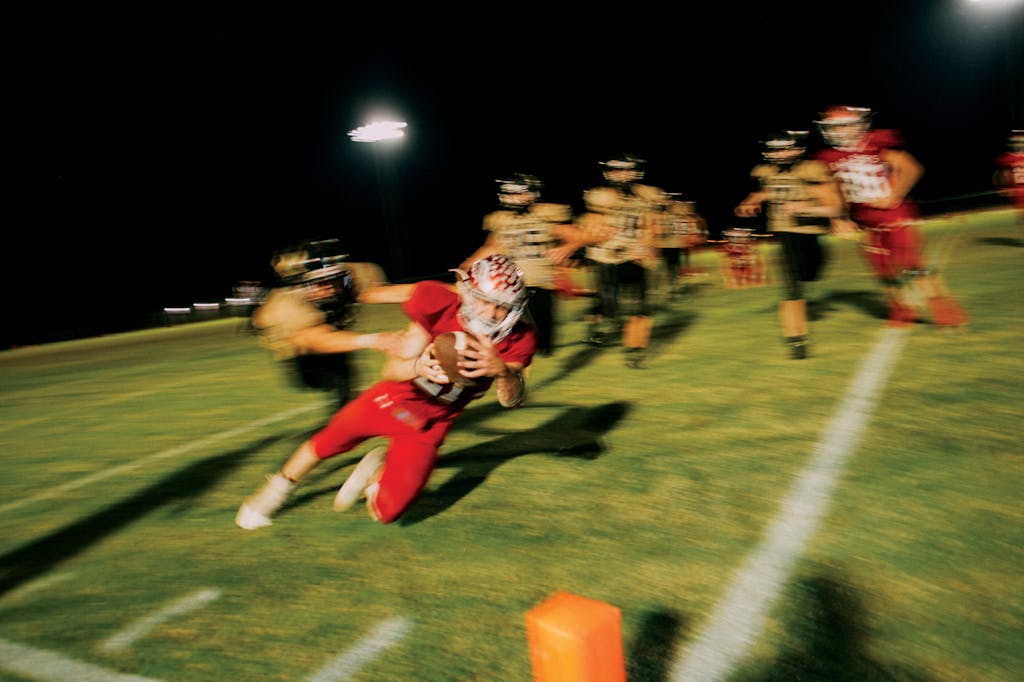
That same night down in the Hill Country, in Medina, the Leakey Eagles held a celebration similar to Ralls’. Leakey 45’d the hometown Bobcats 8-34 with a little more than three minutes left, finishing district play undefeated. The Eagles went from 1–9 to 9–1 in one season.
Williams said he knew going into the season that Leakey could field a good team. “But I wasn’t sure how many kids would buy in [to six-man],” he said. Running back Trace Lackey bought in after initially indicating that—because of the switch to six-man football—he wanted to move and play elsewhere as a senior. Lineman Ashton Bobo bought in, returning to the squad after spending his junior year concentrating on music (he still marched with the band during each halftime). And the team catalyst was its new quarterback, sophomore Hunter Williams, the coach’s son.
Heading into the 32-team Class 1A Division I playoffs, Williams figured his Eagles could win three games. “At least that,” he said. “I feel like we’re as good as anybody in the region.” That assessment has held true so far. The Eagles breezed past Jonesboro in their postseason opener 66–30—Leakey’s first playoff win in football since 1985—then rallied from a six-point halftime deficit against May to win 40–30. This Friday night, the 11–1 Eagles will travel about two and a half hours up to Brady to play 8–4 Gorman.
“The boys are really pumped up, and the school is super excited,” said Joel Pigg, a Leakey school board member and president of the booster club. “I’ve seen community members at the playoff games I have not seen at out-of-town games for years.
“I hope it lasts a while longer.”
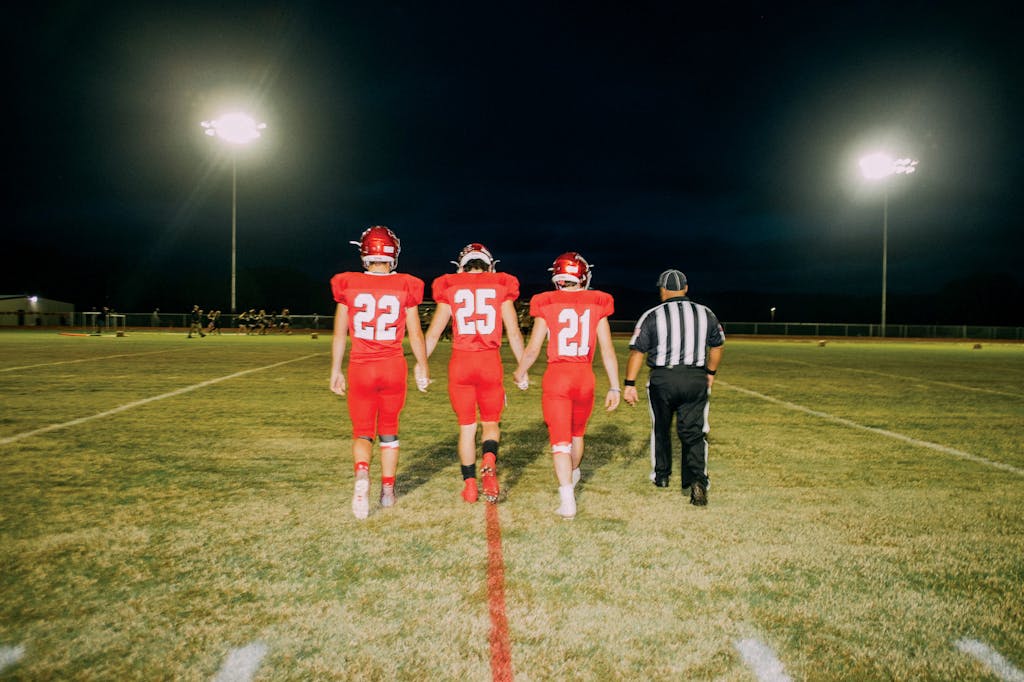
- More About:
- Sports
